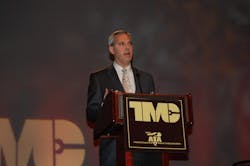ELD mandate, highway trust fund fix top ATA priorities
The American Trucking Associations (ATA), which bills itself as the industry’s largest trade group, plans to make passage of the electronic logging device (ELD) mandate and fixing the highway trust fund (HTF) its top near-term priorities for its lobbying team.
In a press conference held at the group’s Capitol Hill office in Washington D.C., Dave Osiecki, ATA’s executive VP and chief of national advocacy, along with Chris Spear, senior VP of legislative affairs, said those two items are also part of longer list of legislative and regulatory issues the organization will be focusing on.“Support for the ELD mandate is our top priority,” said Osiecki (seen at right, speaking earlier this year at the annual TMC convention). “We want to see the [ELD] final rule published in September this year and so far there is every indication it is on track to do so.”
In terms of the HTF, Spear noted that there are only “five legislative weeks” left for Congress to address the fund’s impending insolvency, which isn’t a lot of time to solidly fix the main source of U.S. road and bridge construction and repair funding.
“The can has a lot of dents from being kicked down the road so many times,” he said. “Yet we have 140,000 bridges in this country that are deficient and need replacement, while 40% of our roads are in major disrepair. So we will continue to advocate for user fees [his term for fuel taxes] indexed to inflation to generate the necessary funds. We’ve got five weeks left so we’re not coming off our mark on this.”
Both Osiecki and Spear touched on several other major issues ATA plans concentrate on for the rest of 2015:
- Drug & Alcohol Test Clearinghouse: ATA continues to support the establishment of a “national clearinghouse” so motor carriers can quickly search and review at previous truck driver test results. “We’re not looking at this as a way to prevent hiring,” Osiecki stressed. “Rather, we want to ensure that potential hires with positive tests go through proper return-to-duty procedures so they are clean and sober when they get behind the wheel.” So far, he said the establishment of such a “clearinghouse” remains on track.
- Support for Hair Testing: ATA believes urine-based drug tests “are not the gold standard now” when it comes to detecting drug and alcohol use. Thus the group plans to continue its push to allow hair testing to be used by motor carriers as another option. “We don’t see this as an ‘either/or’ question,” noted Spear. “Hair testing would be in addition to urine testing as it provides a longer 90-day window to detect drug and alcohol use.” He added that two almost identical bills allowing hair testing are now working their way through Congress and feels the chance to “get this done” legislatively is very high.
- Fixing CSA: Osiecki emphasized ATA still fully supports the Comprehensive Safety Accountability (CSA) program established by the Federal Motor Carrier Safety Administration (FMSA) five years ago. “But the bad news is it [CSA] is not meeting its objectives. And it’s not just us; other government agencies are saying this,” he said. “Our focus is on ensuring that CSA scores are accurate and reliable.”
- HOS restart rule reform: The suspension of the contested 34-hour restart rule late last year should remain in place until the Department of Transportation (DOT) finishes an impact analysis of that specific hours of service (HOS) facet; a report Osiecki does not think DOT will be able to finish until December. “This study should have been done before they made that [restart rule] change,” Spear added. “That’s a key driver why Congress backed this [rule suspension].”
- Graduated CDLs: ATA wants to establish a national “graduated” commercial driver’s license (CDL) that would allow those aged 18 to 21 to operate commercial vehicles on a restricted basis. “This is not a new concept; they are already in use in every state. So how does it make sense that they can drive [a commercial vehicle] east to west across Texas, which is very large, but not across state lines into Oklahoma,” Osiecki said. “This is also an opportunity for us to attract more and younger people into this industry.”
- Opposition to tolling: Spear said ATA will remain opposed to placing tolls on existing interstate highways as a way to generate more money for bridge and road repair. “It’s a wasteful method,” he explained. “Some 70 cents per dollar of tolls gets spend on roads and bridges, compared to 98 cents per dollar of user fees.”
- Opposition to devolution: ATA will also remain firmly opposed to “devolving” surface transportation infrastructure funding from the federal government back to the states. “It’s a good talking point on the ‘state’s rights’ issue, but it’s not good policy and it’s not good for the country,” said Spear. “We strongly believe it is the responsibility of Congress to stand up and fix this; this is their job. Can you imagine devolving responsibility for national defense to the states? That’s why our goal continues to be getting a long-term highway bill done.”
About the Author
Sean Kilcarr
Editor in Chief
Sean Kilcarr is a former longtime FleetOwner senior editor who wrote for the publication from 2000 to 2018. He served as editor-in-chief from 2017 to 2018.

